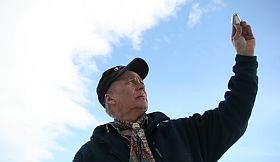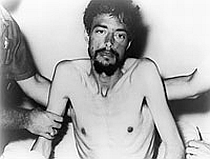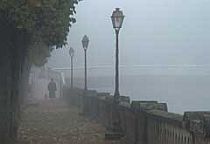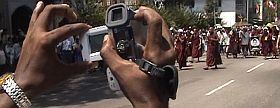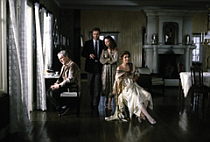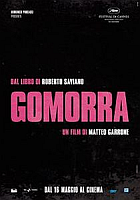


Thomas Danielsson: Troell’s magic mirror
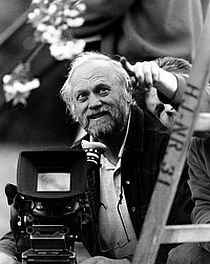
Igen en vigtig nyhed fra Filmstriben.dk: “Troells troldspejl”. Så opmærksomt koordineret med Troells “Eva Larssons evige øjeblik” har Danielsson fået sin film om og med Jan Troell færdig og ud, så den kan bruges på visse skoler og ses på enkelte biblioteker, som abbonnerer på denne netadgang. Tue Steen Müller så den under CPH:DOX ved et arrangement med Jan Troell. Han skrev 11. november her på siden blandt andet:
“…This first part opened with the film about Troell, “Troell’s magic mirror” by Swedish Thomas Danielsson. Sympathetic it is – even if it sometimes feels a bit messy as it wants to have too much information conveyed within the hour it lasts. But you love every little word Troell says, this modest lyrical observer of the world we live in.”
Jeg har det som Tue. Timen forekommer at være alt for kort til dette store og mærkeligt nærværende og gribende materiale, som truer med at sprænge rammen…
Jeg har det som Tue. Timen forekommer at være alt for kort til dette store og mærkeligt nærværende og gribende materiale, som truer med at sprænge rammen…som klipperen Ghita Beckendorff sammen med Danielsson netop så kompetent og resolut administrerer lyrisk i Troells ånd (og lyrik kan jo virke rodet for os, vænnede som vi er til historierne, de episke herfra og dertil). Som den på mange måder tilsvarende, med digteren kongeniale, klipning, som Beckendorff lavede af Lars Johanssons: “Højholt”. Gang på gang griber jeg mig undervejs igennem filmen i at ønske inderligt, at Instruktør og klipper holder lige dén scene lidt længere. Men naturligvis nej, det tillader skanderingen ikke. Til gengæld får jeg, da jeg igen kan trække vejret, denne helstøbte fornemmelse af rigt værk, får den foræret. Og jeg får staks lyst til at se den igen. Det er en smuk film.
Og den handler om det smukke, som jo er det sande, som fotografen lærer Maria -Larsson, og som Jan Troell undersøgte hos Georg Oddner i sin film fra 2002 “Nærvær”. Tue og jeg havde en samtale vi ikke glemmer, og som vi skrev om, så godt vi kunne: “… det er jo den måde jeg gerne vil lave film på, også spillefilm. Jeg håber på, at der sker noget.” Som Hitchcocks fortograf med benet i gips, som Dvortsevoy, der venter og venter, mens barnet på gulvet spiser. Og hver gang sker der noget, noget sandt.
Denmark, 2008. 59 min. Production and distribution Final Cut Productions, Copenhagen finalcut@final-cut.dk http://www.filmstriben.dk/
Jan Troell: Nærvær (Presence), 2002. Produktion og distribution: Athena Film, Stockholm http://www.athenafilm.se/english.asp info@athenafilm.se
Litt.: Tue Steen Müller og Allan Berg Nielsen: Nu æder lyset sig ind i sølvet, samtale med Jan Troell, FILM #30, 2003 http://www.dfi.dk/tidsskriftetfilm/30/nuaederlysetsig.htm
